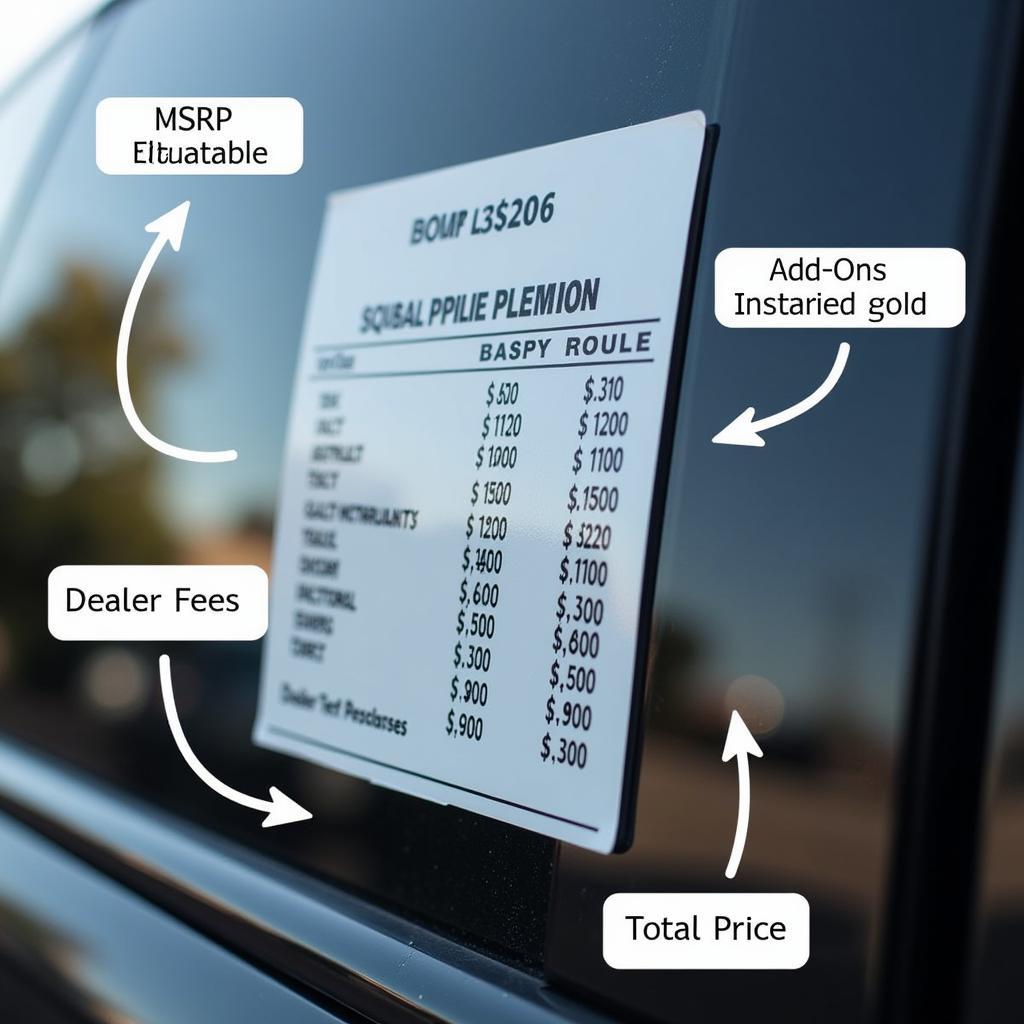Finding the right used car can feel like navigating a minefield, especially when dealing with dealerships. Understanding how to evaluate a used car’s price is crucial to avoid overpaying. This article dives into the essential tools to evaluate used car price from a dealer, empowering you to make informed decisions and secure the best possible deal.
Decoding the Sticker Price: Your First Step in Evaluating Used Car Price from a Dealer
The sticker price is your starting point, but rarely the final price. Don’t let it intimidate you. It’s simply the dealer’s initial offer, and there’s almost always room for negotiation. Understanding what factors influence that sticker price is key to effectively evaluating a used car’s price from the dealer. Everything from mileage and condition to market demand and the dealer’s overhead contributes to the number you see.
 Used Car Dealer Sticker Price Breakdown
Used Car Dealer Sticker Price Breakdown
Essential Online Tools for Used Car Price Evaluation
The internet offers a wealth of resources to help you determine a fair price. Sites like Kelley Blue Book (KBB), Edmunds, and NADA Guides provide detailed pricing information based on year, make, model, mileage, condition, and location. These tools empower you to research and compare prices, giving you a realistic benchmark when evaluating a used car price from a dealer.
Leveraging KBB, Edmunds, and NADA Guides: A Comparative Approach
Each platform offers slightly different perspectives, so using all three provides a comprehensive picture. KBB often leans towards the consumer side, while NADA tends to favor dealer perspectives. Edmunds provides a balanced view. Cross-referencing these tools lets you identify potential discrepancies and strengthens your negotiating position.
Beyond the Basics: Factors Influencing Used Car Prices
Mileage and condition are obvious factors, but other less apparent elements impact a car’s value. These include the vehicle’s history (accidents, repairs), optional features, and even the current market demand. Understanding these nuances provides a deeper understanding of how to evaluate used car price from a dealer.
Unmasking the Vehicle History: A Crucial Step
A vehicle history report from Carfax or AutoCheck is essential. It reveals past accidents, title issues, and maintenance records, providing crucial insights that can significantly affect the price. Don’t skip this step!
Market Dynamics: Understanding Supply and Demand
Like any commodity, car prices fluctuate based on market conditions. High demand for a specific model can drive up prices, even for used vehicles. Researching market trends helps you gauge whether a dealer’s price is reasonable.
Negotiating with the Dealer: Putting Your Knowledge into Action
Armed with the information gathered from online tools and vehicle history reports, you’re ready to negotiate. Don’t be afraid to walk away if the dealer isn’t willing to meet you at a fair price.
Tips for Effective Negotiation:
- Be confident: Knowledge is power. Present your research and justify your offer based on the data you’ve collected.
- Be prepared to walk away: This shows the dealer you’re serious and not emotionally attached to a particular car.
- Focus on the out-the-door price: This includes all fees and add-ons, not just the sticker price.
 Negotiating Used Car Price at Dealership
Negotiating Used Car Price at Dealership
Conclusion: Mastering the Art of Used Car Price Evaluation
Evaluating a used car price from a dealer doesn’t have to be daunting. By utilizing online tools, understanding market dynamics, and employing effective negotiation tactics, you can confidently secure the best possible deal on your next used car. Remember to prioritize research and be assertive in your negotiations to drive away with a vehicle that fits both your needs and your budget. Using the tools discussed in this article, you’re now equipped to confidently evaluate used car price from a dealer.
FAQ:
- What is the most important factor when evaluating a used car’s price? Condition and mileage are key, but vehicle history is crucial.
- Are dealer prices negotiable? Almost always, yes.
- Should I trust the sticker price? Use it as a starting point, but do your research.
- Why is a vehicle history report important? It reveals hidden problems that could impact the value.
- How can I negotiate effectively? Be confident, prepared, and focus on the out-the-door price.
- What are some reliable online pricing tools? KBB, Edmunds, and NADA Guides.
- How can I determine the fair market value of a used car? By comparing prices from multiple online sources and considering factors like condition, mileage, and vehicle history.
Other Questions and Related Articles
- What are the common scams to watch out for when buying a used car from a dealer?
- How to inspect a used car before buying?
- Financing options for used cars.
- Find more articles about car diagnostic on our website DiagFixPro.
Contact us for further support via WhatsApp: +1(641)206-8880, Email: [email protected] or visit us at 910 Cedar Lane, Chicago, IL 60605, USA. Our customer service team is available 24/7.

Leave a Reply